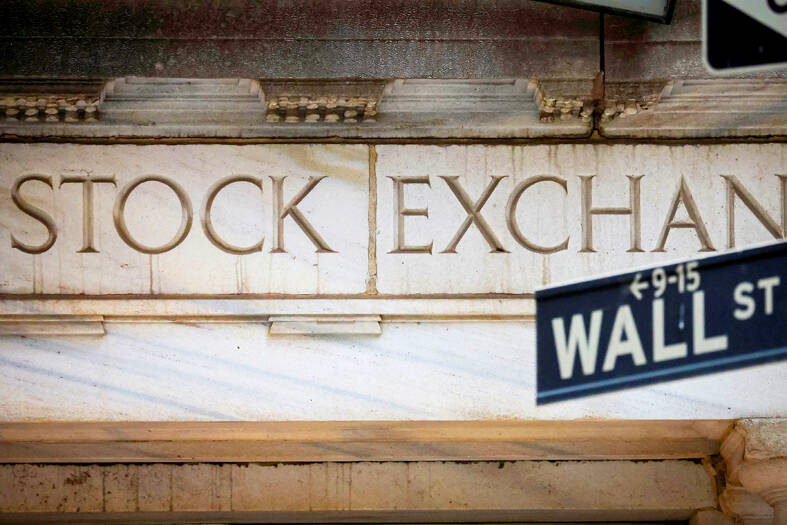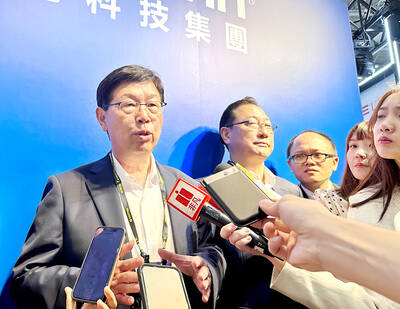Equity investors hoping that next year might be better are likely to be disappointed, said Goldman Sachs Group Inc strategists, adding that the bear market phase is not yet over.
“The conditions that are typically consistent with an equity trough have not yet been reached,” strategists including Peter Oppenheimer and Sharon Bell wrote in a note yesterday.
They said that a peak in interest rates and lower valuations reflecting recession are necessary before any sustained stock market recovery can happen.

Photo: Reuters
The strategists estimate that the S&P 500 is likely to settle at 4,000 points by the end of next year — just 0.9 percent higher than Friday’s close — while Europe’s benchmark STOXX Europe 600 should finish next year about 4 percent higher at 450 points.
Barclays PLC strategists led by Emmanuel Cau have the same target for the European gauge and said the path to get there would be “tricky.”
The comments come after a recent rally — driven by softer US inflation data and news of easing COVID-19 restrictions in China — that saw several global indices enter technical bull market levels. The sharp rebound since the middle of last month followed a tumultuous year for global markets, as central banks embarked on aggressive rate hikes to tame soaring inflation, stoking concerns of recession.
Goldman strategists said the gains are not sustainable, because stocks do not typically recover from troughs until the rate of deterioration in economic and earnings growth slows down.
“The near-term path for equity markets is likely to be volatile and down,” they said.
The view echoes that of Morgan Stanley analyst Michael Wilson, who said yesterday that US stocks are likely to be almost unchanged by the end of next year from their current level, and should have a bumpy ride to get there, including a big decline in the first quarter.
Wilson’s note yesterday said that clients have pushed back against his view of the S&P 500 falling to as low as 3,000 points in the first three months of next year — a drawdown of 24 percent from Friday’s close.
“What’s yet to be priced is the earnings risk and that is what ultimately will serve as the catalyst for the market to make new price lows,” he said.
Still, strategists are not all united about the fate of stocks after this year’s volatility.
“Three double-digit rallies this year in the S&P 500 argue a case that as difficult as 2022 has been for equity markets, there’s enough resilience to suggest that this year could be a harbinger for better times ahead,” Oppenheimer Asset Management chief investment strategist John Stoltzfus wrote in a note yesterday.
Meanwhile, Goldman strategists expect Asian stocks to outperform next year, with the MSCI Asia-Pacific ex-Japan ending the year 11 percent higher at 550 points.
Their peers at Citigroup Inc turned more bullish on Chinese stocks yesterday, saying Beijing’s pivots on its “zero COVID” strategy and property curbs should lift earnings.
With the bear market still in full swing for now, Oppenheimer and his team recommend focusing on quality companies with strong balance sheets and stable margins.

Taiwan Transport and Storage Corp (TTS, 台灣通運倉儲) yesterday unveiled its first electric tractor unit — manufactured by Volvo Trucks — in a ceremony in Taipei, and said the unit would soon be used to transport cement produced by Taiwan Cement Corp (TCC, 台灣水泥). Both TTS and TCC belong to TCC International Holdings Ltd (台泥國際集團). With the electric tractor unit, the Taipei-based cement firm would become the first in Taiwan to use electric vehicles to transport construction materials. TTS chairman Koo Kung-yi (辜公怡), Volvo Trucks vice president of sales and marketing Johan Selven, TCC president Roman Cheng (程耀輝) and Taikoo Motors Group

Among the rows of vibrators, rubber torsos and leather harnesses at a Chinese sex toys exhibition in Shanghai this weekend, the beginnings of an artificial intelligence (AI)-driven shift in the industry quietly pulsed. China manufactures about 70 percent of the world’s sex toys, most of it the “hardware” on display at the fair — whether that be technicolor tentacled dildos or hyper-realistic personalized silicone dolls. Yet smart toys have been rising in popularity for some time. Many major European and US brands already offer tech-enhanced products that can enable long-distance love, monitor well-being and even bring people one step closer to

RECORD-BREAKING: TSMC’s net profit last quarter beat market expectations by expanding 8.9% and it was the best first-quarter profit in the chipmaker’s history Taiwan Semiconductor Manufacturing Co (TSMC, 台積電), which counts Nvidia Corp as a key customer, yesterday said that artificial intelligence (AI) server chip revenue is set to more than double this year from last year amid rising demand. The chipmaker expects the growth momentum to continue in the next five years with an annual compound growth rate of 50 percent, TSMC chief executive officer C.C. Wei (魏哲家) told investors yesterday. By 2028, AI chips’ contribution to revenue would climb to about 20 percent from a percentage in the low teens, Wei said. “Almost all the AI innovators are working with TSMC to address the

FUTURE PLANS: Although the electric vehicle market is getting more competitive, Hon Hai would stick to its goal of seizing a 5 percent share globally, Young Liu said Hon Hai Precision Industry Co (鴻海精密), a major iPhone assembler and supplier of artificial intelligence (AI) servers powered by Nvidia Corp’s chips, yesterday said it has introduced a rotating chief executive structure as part of the company’s efforts to cultivate future leaders and to enhance corporate governance. The 50-year-old contract electronics maker reported sizable revenue of NT$6.16 trillion (US$189.67 billion) last year. Hon Hai, also known as Foxconn Technology Group (富士康科技集團), has been under the control of one man almost since its inception. A rotating CEO system is a rarity among Taiwanese businesses. Hon Hai has given leaders of the company’s six